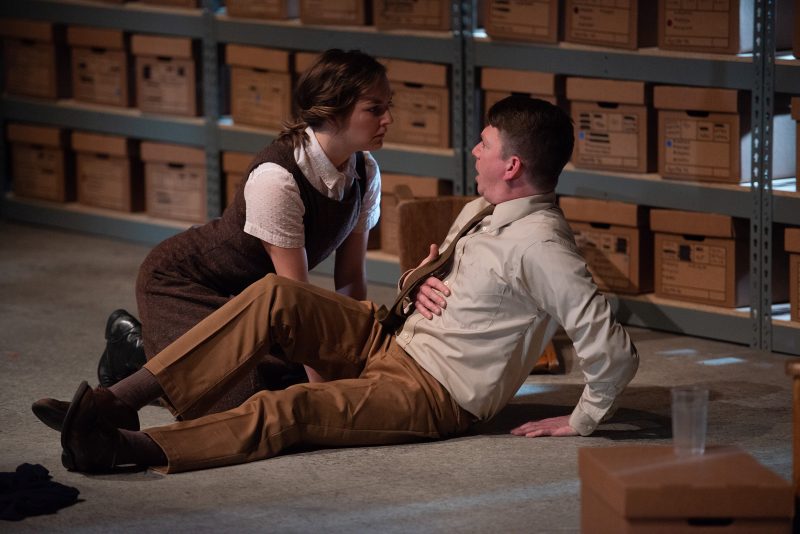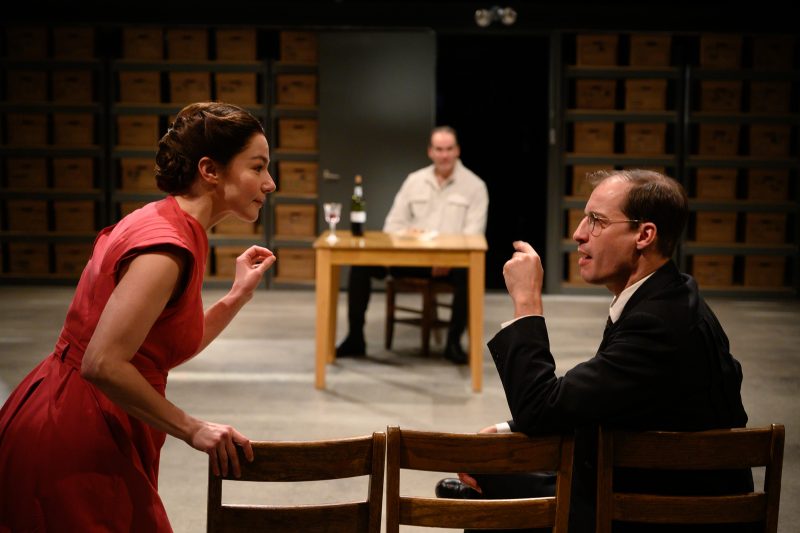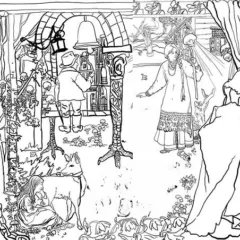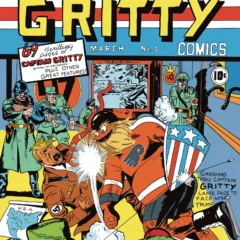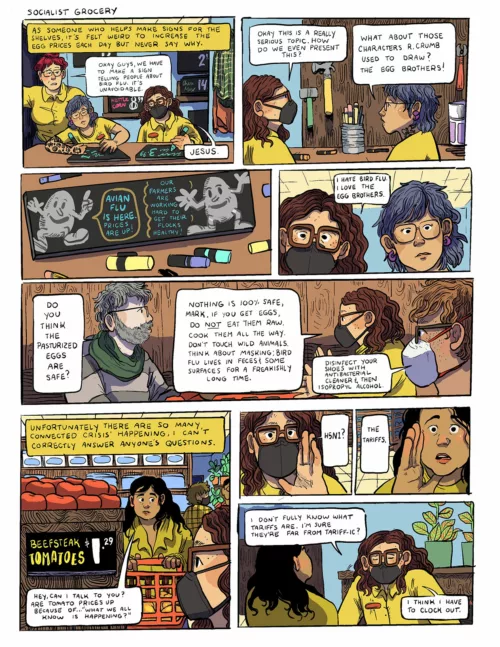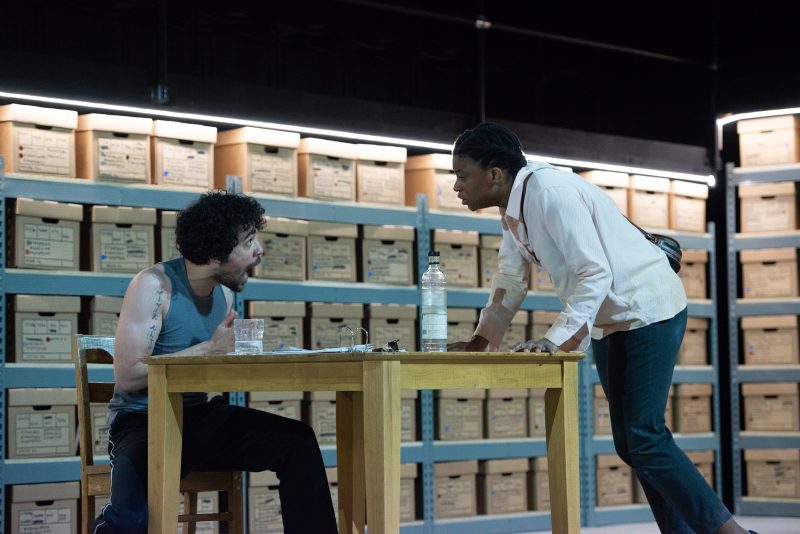
I saw Rajiv Joseph’s Describe the Night at the Wilma Theater on February 5, 2020. Earlier that day, the United States Senate had voted almost entirely along party lines to acquit President Trump of impeachment charges. The stupefying events of the preceding months—the whistleblower’s complaint, the “exact word-for-word transcript” of Trump’s conversation with Ukraine’s President Zelensky, which turned out to be both imprecise and abridged, the flouting of subpoenas, the photos of Trump with Ukrainian campaign finance fraudsters he denied knowing,—had culminated in the great clash of narratives that was the Senate impeachment trial. With no witnesses or documents admitted for consideration, reality was up for grabs. In the end the only truth, as Foucault might say, was power. The Republicans had the votes, and they stood by their man.
Consequently, Joseph’s play about the unstable relationship between fact and fiction in Russia under Stalin and Putin was alarmingly legible. The first scene sets up the dialectic of Describe the Night—a civilian has died and two men, a writer and a soldier, circle around putting the event into words. At first, the writer’s imagination soars while the soldier’s descriptions remain thuddingly literal. The writer invents freely, for metaphysical purposes, but the soldier only gets inspired when it dawns on him that invention can serve political purposes, too. The soldier tells a story of the civilian’s death that omits much and changes certain key details, leaving the soldier looking like a victim where he might have come out looking like the villain.
This inaugural, self-serving redaction marks the beginning of what will be the soldier’s long career of crafting “official” narratives for the Soviet Union as Stalin’s right-hand man—we soon learn that he is the murderous apparatchik Nikolai Yezhov and that his writer friend is Isaac Babel. The serpentine plot of Describe the Night follows these and other partly-historical, partly-fictional characters from one crisis of values to another. As their personal and political lives come into conflict, reality becomes a negotiation—rather than asking the audience to follow a conventional narrative, Joseph jumps forward and back in time, inviting us to track who has the leverage.
Lies driven by ideals, and lack thereof
Nikolai learns to lie for a beautiful ideal that becomes a revolution which devours its own children. He extols the virtues of “The Black Magic Marker: The most useful tool in all of communism.” Redactions conceal the terrible individual sacrifices that must be made for the collective and the places where theory, no matter how elegant, fails to align with the practical exigencies of building a socialist paradise. In Joseph’s play, as in history, however, Nikolai works his way up from redacting inconvenient truths to “redacting” inconvenient people, ultimately presiding over the period of bloody excess that came to be known as the Great Terror, or Yezhovshchina, after its principle architect. Hundreds of thousands were framed, accused of counter-revolutionary activities, prosecuted in show trials, and put to death, a model of justice that, as depicted in Describe the Night, felt remarkably unexotic given our present political situation. Just last week, former Deputy Attorney General (and American hero) Sally Yates accused Trump of treating the U.S. Department of Justice like “his personal grudge squad.” The difference between Trump and Nikolai Yezhov is that Trump needs no pretext for his lies—there is no beautiful ideal, only Trump’s ugly, naked self-interest and the Republican apparatchiks too afraid of the consequences of disloyalty to resist.
Few of Describe the Night’s other characters are simple innocents. High-minded as his fiction-writing is, Isaac also proves capable of telling stories, or lies, to serve his own venal ends. Nikolai and Isaac remain close for years, so close that Isaac has an affair with Nikolai’s wife Yevgenia. Dreamy and bookish and married to a repressed homosexual autocrat who shouts orders at her from the other room, Yevgenia is drawn to Isaac’s easy confidence and irreverence, his ability to conjure up new, lawless worlds for the two of them to make their playgrounds. Playtime ends when the purges begin. Nikolai has Yevgenia permanently committed to the state asylum for the insane to keep her “safe” from the torturers and inquisitors. Or perhaps he is just paying her back for her infidelity. Murky motives also complicate Nikolai’s execution of Isaac, who is officially accused of writing “subversive, Anti-Soviet literature,” stories with such “seditious” themes as “self-awareness.” Unofficially, he “knows too much” about Nikolai. When truth is power and power is truth, nothing is as honest as a bullet to the brain.
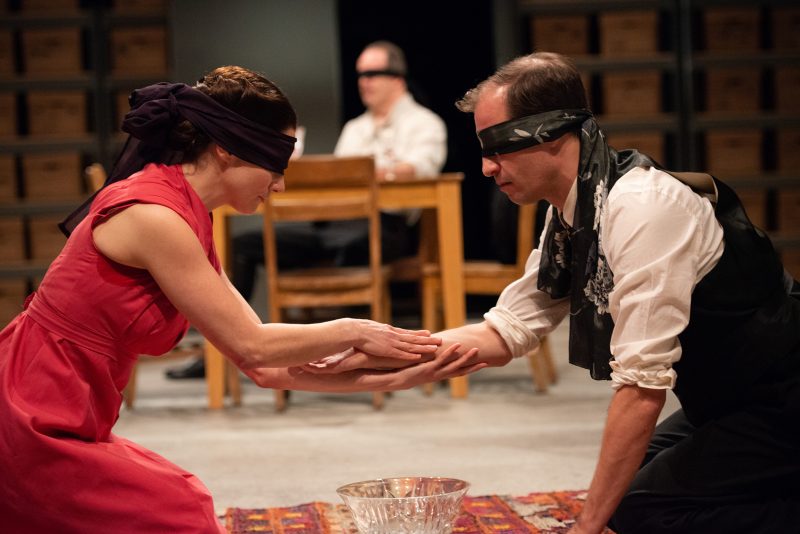
Nikolai and Isaac’s story is entwined with several others, notably a subplot driven by the rise of an ambitious KGB officer named Vladimir. In love with Isaac and Yevgenia’s granddaughter, who escapes to the West, the young Putin vows to put the fallen Berlin Wall back together, piece by piece, if that’s what it takes to find her. The Putin of Describe the Night emerges as a strange and dangerous blend of Isaac and Nikolai’s temperaments—both uncommonly sentimental and exceptionally ruthless. He, too, needs no cause greater than himself to justify the violent suppression of dissent. Spending nearly three hours mulling over the psychosexual conflicts that have made men like Trump and Putin who they are may not sound like a terribly appealing way to spend one’s evening if one spends one’s days paying attention to the news, but these are, alas, probably the most important issues of our time.
Director Blanka Zizka specializes in narratives of intergenerational trauma, of individual lives mutilated by the forces of history, and with Describe the Night she both plays to her strengths and achieves a contemporary resonance not seen at the Wilma since James Ijames’ Kill Move Paradise in 2018. The production features performances calibrated to prioritize the world-historical significance of the characters over their emotional lives. The best of all possible productions might make more space for the actors to be authentically vulnerable, but as it is, Zizka’s Describe the Night is an intellectual triumph. Dark times call for difficult theater, and Describe the Night is difficult in all the right ways—philosophical, ingenious, and in its own, odd, sidelong way, frighteningly true-to-life.
“Describe the Night,” by Rajiv Joseph, Directed be Blanka Zizka, January 28- February 22, 2020, at the Wilma Theatre. Tickets available here.
More Photos
